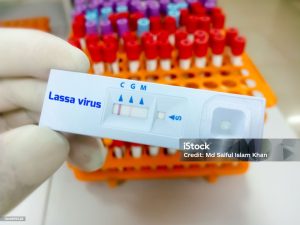

NIGERIA’s quest to enhance its health system with self-care for sexual, reproductive and maternal health and rights has been boosted with the launch of two safe self-care and injection acceleration projects.
The projects, Self-Care Accelerator Project (S-CAP) and Community-Oriented DMPA-SC/Self-Injection Acceleration in Nigeria (CODSAiN) Project, is being funded by the Bill and Melinda Gates Foundation have an implementation period from December 2022 to November 2023 and 2023
While John Snow Incorporated (JSI) is the implementing partner for Self-Care Accelerator Project (S-CAP); Association for Reproductive and Family Health is implementing CODSAiN.
The initiatives are targeted at safe self-administration of some medicines, self-diagnosis and improvement in health awareness and literacy in the country.
Giving an overview of the Self-Care Accelerator Project (S-CAP) at the launch of the projects in Abuja,Dr Adewole Adefalu, Country Coordinator John Snow incorporated, explained that,”Self-care will empower women and men, families, and communities to carry out effective health actions, with or without support from health care providers.”
He recalled that: “Nigeria was one of the first countries to adopt the WHO’s Consolidated Guideline on Self-Care Interventions for Health: Sexual and Reproductive Health and Rights which provides a people-centred, evidence-based normative guidance to support individuals, communities and countries with quality health services and self-care interventions. “
“In 2021, the Federal Ministry of Health developed the National Guideline on Self-Care for Sexual, Reproductive and Maternal Health, which provides national direction on the integration of Self-care interventions for SRMH into the Nigerian health system as well as its implementation.
” Since then, there have been concerted efforts to disseminate the National Guideline and Self-Care Demand Generation Strategy while providing orientation at national and sub-national levels,”he said.
According to Dr Adefalu,”The project will employ the key principles of coordination, adaptive learning, and practical outputs to:Accelerate and institutionalize a national self-care agenda in Nigeria;Identify policy and regulatory bottlenecks for self-care scale up;Advance the national self-care subcommittee work plan and identify lessons for self-care scale up in additional geographies.”
The target audience of the project,he said,are,” National and state level policymakers, program managers, health workers, donors, and civil society organizations responsible for making decisions related to the delivery or promotion of self-care interventions.”
“Other target audiences include product developers, manufacturers, communities, and all individuals affected by the recommendations in the National Guideline on Self-Care for Sexual, Reproductive and Maternal Health,”he added.
According to him, the key message in initiating the project is,”The scale up and use of self-care interventions as outlined in the National Guideline on Self-Care for Sexual, Reproductive and Maternal Health has the potential to boost Nigeria’s modern contraceptive prevalence rate, result in cost-savings and accelerate progress towards achieving universal health coverage.”
He spoke further:” Self-care will empower women and men, families, and communities to carry out effective health actions, with or without support from health care providers. The value proposition with self-care lies in the opportunity to support healthcare systems.
When fully introduced, self-care reduces the burden on healthcare providers, limiting their role to initiating, educating and supporting individuals who are more empowered to take effective health action.
“This innovation includes interventions that are targeted at safe self-administration of some medicines, self-diagnosis and improvement in health awareness/literacy.
“Self-care offers a paradigm shift, empowering individuals and communities and saving the bludgeoning healthcare cost. The dwindling health investments and competing public health cost makes self-care the solution for the future in Nigeria and many African countries. John Snow Inc. will, through this BMGF-funded grant, work with the government to lead the coordination of the scale up of self-care in Nigeria.
“Our role is to support the government at all levels to unlock all policy bottlenecks to full scale up interventions with the self-care product portfolio, lead stakeholder coordination and provide technical assistance to all ongoing efforts to fully integrate this innovation into the sexual reproductive and maternal health systems in Nigeria.”
Speaking on the Community-Oriented DMPA-SC/Self-Injection Acceleration in Nigeria (CODSAiN) Project, Dr Kehinde Osinowo, Chief Executive Officer, Association for Reproductive and Family Health (ARFH),noted that,”ARFH reaches 1million Nigerian women with family planning methods DMPA-SC & Self-injection.
(Vanguard)









